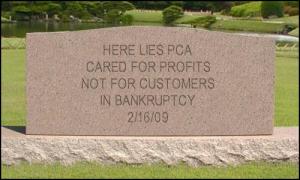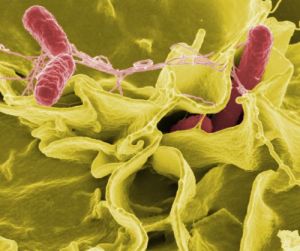PCA Goes To The Lonesome Valley
The practice of selling food additives laced with salmonella bacteria makes it difficult to win back the trust of customers that had been so grievously violated.
PCA’s actions to knowingly ship contaminated products that have resulted in nine deaths and have sickened 637 people in 44 states. PCA’s salmonella laced peanut paste has contaminated 2,226 processed food products. A full list of recalled products can be found on the FDA website. These potentially criminal acts by PCA’s management has demolished the PCA corporate brand making it impossible to continue as a going concern.
The Chapter 7 bankruptcy filing will liquidate the company. This strategy will protect the PCA shareholders in the privately held firm from the significant legal liability that this event has created. It does not however protect PCA’s company management and accomplices that knowingly shipped contaminated products from potential criminal prosecution. Criminal persecution of those involved should be pursued and if anyone is found guilty punishment must be severe.PCA released its contaminated product into a large and extensive supply chain. Many leading brand food processing manufacturers that use PCA’s peanut paste as an ingredient in their packaged goods products have suffered severe reputational damage to their product and company brands. Though PCA’s corporate liability may be mitigated with the bankruptcy filing, aggrieved consumers will continue to have have legal recource by filing suits against the major consumer product companies that are still in business. This could make for a record breaking class action product liability suit.
Unfortunately this tragic occurrence could have been prevented. PCA’s actions demonstrate a disturbing ambivalence toward effective sound corporate governance practices. Companies that willingly sacrifice risk management and ethical business practices for the sake of short term profits consistently undermine corporate sustainability. All may not result in a dramatic corporate implosion like PCA. But ultimately the song of corporate liquidations remains the same. Unemployment for workers, aggrieved consumers, community desertion, tortured consciences and and in some instances criminal prosecution.
RIP PCA.
You Tube Video: Fairfield Four, Lonesome Valley
Risk: corporate goverance, ethics, risk management, legal
Kashi’s Kismet
Last night as I was researching the Peanut Corporation of America’s (PCA) peanut paste recall, my wife received an urgent telephone call from our local supermarket. The caller informed us that the Kashi products we purchased were subject to recall. I was a bit astonished by the call for several reasons. The first being notified of the unhappy news that a premium brand product that I so enjoy has the potential to kill me or make me very ill due to Salmonella bacteria. It goes without saying that it was a most bracing experience. I was also a bit bemused about the ability of my local supermarket to track me down to inform me that my favorite breakfast cereal might endanger me. At the very least letting me know that this is no breakfast for champions.
Though this is a positive example of how consumer product data mining and customer tracking business intelligence is employed; the realization that your breakfast eating habits are tucked away in some giant relational database remains a bit unnerving. But that is a different subject for another day.
After checking with the Kashi website the cereal products I purchased were not listed on the recall list. Kashi website lists granola bars and cookies as its only products that are subject to recall. As a committed consumer of the brand I remember when I purchased the cereal a free granola bar was included in the package for product promotional purposes. When I returned home I eagerly consumed the free granola bars. I am happy to report that I have not fallen ill. I’ll have to go back to the supermarket and ask if the non contaminated cereal I still have in my cupboard remains subject to the recall. An interesting product bundling dilemma.
The mechanics and execution of the product recall seems to be effective. The sophisticated use of data mining technologies and the ability of the manufacturer to contact a retail consumer through a digital trail that includes customer loyalty cards, credit card, and product bar codes is pretty impressive.
What is of concern about Kashi and other processed food manufacturers that are dependent on an expanded and complex supply chain is their failure to uncover the risk associated with the supplier. In this case PCA. It is alleged that PCA had a leaky roof that played a role in contaminating the peanut paste. A simple walk through of the facility may have uncovered this risk factor. Certainly if a company fails to perform the most basic facilities maintenance functions (like a leaky roof) odds are that the company has other issues and businesses functions that it is not addressing. This is the cockroach theory. Where you see one there are usually many others. A simple walk through may have revealed that all was not kosher at PCA.
Supply chain risk is becoming more prominent as manufacturers and service providers aggregate components and ingredients from numerous providers to deliver a finished product or service to end user consumers. The implementation of a sound practice program that addresses risk associated with supply chains is a key ingredient for a sustainable business enterprise.
The Profit|Optimizer devotes a section to supply chain risk. All process manufacturers must require suppliers to conduct a thorough risk assessment of processes and functions as outlined in the Profit|Optimizer. The Profit|Optimizer also includes a section on facilities risk. The risk assessment tools offered by the Profit|Optimizer would have uncovered the dangerous risk factors at PCA and may have prevented the fatal and costly release of contaminated products.
The kismet of commercial enterprises like Kashi will continue to be bright so long as the mantra of sound risk management is practiced with more vigilance. In doing so the health and well being of its loyal customers will flower as will the value of its product brands and the sustainability of the business.
You Tube Video: Vince Guaraldi, The Peanuts Theme
Risk: reputation, brand, product liability
Peanut Corporation of America
 A salmonella breakout that has been traced to peanut products marketed by the Peanut Corporation of America (PCA) is an unfortunate and severe example of a company with poor risk management, weak corporate governance controls and questionable ethical business practices. In most instances poor risk management and corporate governance violations primarily victimizes the company that fails to institute them. In the case of the PCA, unsound business practices has unleashed a deadly viral bacteria into a vast consumer market. Since its outbreak in October the salmonella infection is believed to have claimed the lives of 8 people and has sickened over 500. PCA violations will also cast a long shadow on the vibrant US peanut growers and processing industry.
A salmonella breakout that has been traced to peanut products marketed by the Peanut Corporation of America (PCA) is an unfortunate and severe example of a company with poor risk management, weak corporate governance controls and questionable ethical business practices. In most instances poor risk management and corporate governance violations primarily victimizes the company that fails to institute them. In the case of the PCA, unsound business practices has unleashed a deadly viral bacteria into a vast consumer market. Since its outbreak in October the salmonella infection is believed to have claimed the lives of 8 people and has sickened over 500. PCA violations will also cast a long shadow on the vibrant US peanut growers and processing industry.
A brief examination of some of the public disclosures that have come to light concerning the PCA speaks of a telling breakdown in sound risk management practices. These disclosures also hints at potential instances of fraud to cover up lax controls and compliance violations cited by FDA and State of Georgia food safety examiners.
The PCA had been cited for violations and lax operational controls during past inspections by regulatory agencies. Inspectors found evidence of roach infestation and mold in the production and storage facilities. Inspections also revealed that product quality had been compromised due to a degraded manufacturing process and improper maintenance of the operating facility. After bringing this to the attention of company management PCA executives sought out food testing companies that would provide results to indicate that product quality met federal safety standards and were safe to ship.
Utilizing industry standard risk analysis tools like the Profit|Optimizer would have revealed several breaches in sound risk management practices at PCA. Lax operational controls, poor facilities and the evasion of corporate governance practices will likely put PCA out of business due to the damage its actions have done to company product brands and reputation.
Problems and risks associated with process manufacturers like PCA add layers of complexity to determine product risk due to its role as a supplier in an intricate and expanded supply chain for processed consumer food products. The melamine contamination of Chinese milk products and the mortgage backed securities market crisis provide examples of how product liability and consumer risk is leveraged due supply chain complexity. The pervasiveness of products that use the peanut paste manufactured by PCA is very similar in many respects. Cookies, ice cream, crackers and other products are subject to recall. Some of the companies affected by PCA’s contaminated products include premium consumer product and brand marketing companies like Kellogg, General Mills, Jenny Craig, Nuti-System and Trader Joes.
Severe product liability events like this unfortunately also cast aspersions on an entire industry. Associations like the American Peanut Council are most concerned that the poor manufacturing practices and product quality standards exhibited by PCA will reflect on how consumers view the industry as a whole. It is a valid concern for the industry association and it must demonstrate to the regulators and consumers that its membership is committed to sound manufacturing practices, product quality and corporate governance excellence. This is not a PR problem. Nor is it a problem born from an industries anathema to regulatory control or a problem unleashed by some renegade industry member. Industries and their representative associations must also help address sound risk management and corporate governance excellence as a cultural issue that is endemic to its membership. Then industry excellence becomes synonymous with product quality and consumer satisfaction.
In all the FDA uncovered 10 violations and has published its report and carries a full listing of recalled products and other resources on the FDA website.
You Tube Video: Dizzy Gillespie’s Big Band, Salt Peanuts
Risk: product, operations, regulatory, reputation

